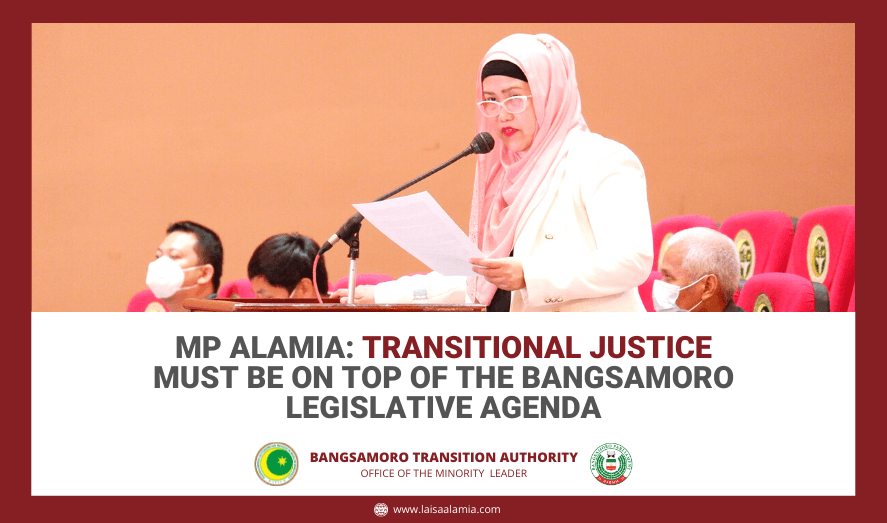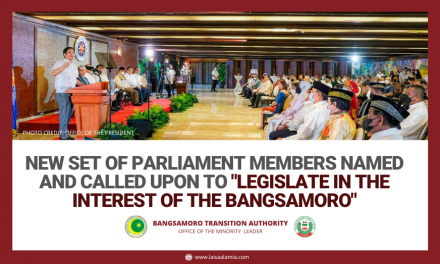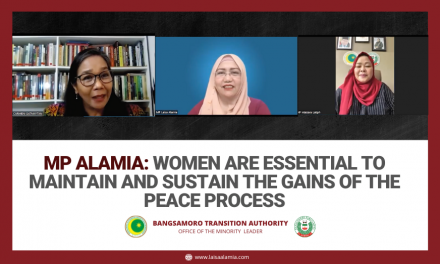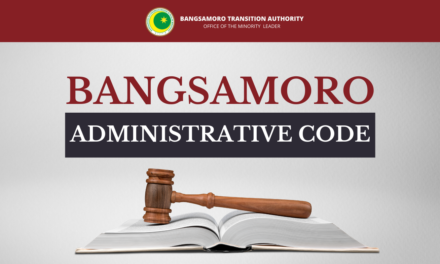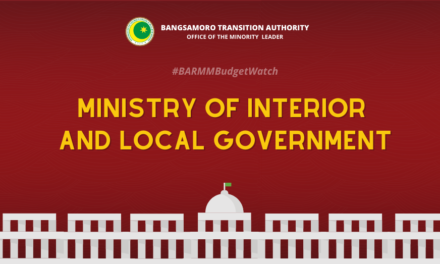Human rights lawyer and Minority Floor Leader MP Atty. Laisa Masuhud Alamia has filed on Thursday a legislative package with four bills focusing on transitional justice and reconciliation (TJR), in support of ongoing initiatives meant to uplift conflict-affected communities in the Bangsamoro and uphold the rights and welfare of former combatants across the region.
MP Alamia has been consistent in her push to establish TJR mechanisms in the Bangsamoro. In past and recent engagements with civil society on the topic of transitional justice in the region, she has also asserted that healing and reconciliation in the region can only be effectively addressed through a genuine collaboration between national and regional governments.
“Establishing the Bangsamoro as a new political entity is no doubt an important milestone in our long and arduous struggle for just and lasting peace,” MP Alamia said, and “this requires commitment in taking concrete steps forward if the regional government wants to realize the hopes and aspirations of the people in sustainable ways.”
Among the steps that the regional government must take, MP Alamia noted, is empowering the Bangsamoro people as active participants in the collective pursuit of transitional justice. “This is crucial,” she said, ”if we are to restore and reinforce relationships anchored by faith and confidence among our region’s diverse communities, which will then enhance social cohesion during the process of political transition.”
Four bills to help bridge decades-old justice gaps
“Making sure TJR mechanisms are institutionalized in the regional government is fundamental to our peacebuilding process,” said MP Alamia. Working together with her fellow legislators, the Bangsamoro Parliament adopted Resolution No. 58 early last year, calling for the creation of a transitional justice and reconciliation commission in the BARMM.
However, MP Alamia also emphasized that it is imperative that legislation be passed in order to help lay down the foundations for the regional government’s TJR approach, and institutionalize policies and programs for communities that continue to reel from generations of violence and conflict.
The TJR legislative package includes the Bangsamoro Armed Conflict Human Rights Violations Documentation Bill, the Bangsamoro Mujahideen/Mujahidat Benefits System Bill, the Bangsamoro Health Care Subsidy Program Act Bill, and the Regional Transitional Justice and Reconciliation Commission for the Bangsamoro Bill.
Taken together, these four bills cover a wide range of issues that have dampened community efforts to move forward in a post-conflict context — many of them generational struggles such as limited access to education and livelihood opportunities, lack of social support for senior citizen combatants and their families, and marginalization due to land dispossession.
Transitional justice is a human rights issue
“Making TJR a key component of regional governance allows us to draw an effective strategy towards just and lasting peace,” MP Alamia said. “It helps us address and redress human rights violations committed before and during this seemingly quiet but no less volatile period of transition.”
MP Alamia also noted the importance of “reparations and guarantees of non-recurrence,” as both the regional and national government, alongside Bangsamoro stakeholders and the Filipino society at large “mutually carries the peacebuilding agenda to fruition.” Given the regional government’s limited jurisdiction and authority, it is essential to have a multi-sectoral engagement while working on TJR-related matters in the region.
Establishing a system for a comprehensive human rights violations documentation across the region is integral to the truth-seeking process in the Bangsamoro, while the bill that seeks to institutionalize a Regional Transitional Justice and Reconciliation Commission for the Bangsamoro ensures that TJR initiatives and efforts are sustained not only by the will of the people, but by regular appropriations that will fund the operations of the said commission.
Meanwhile, the benefits system and the Bangsamoro Health Care Subsidy Program indicated in the TJR legislative package’s remaining two bills help address generational issues like poverty and hunger that are rooted in the region’s history of violence and conflict. Health and education subsidies for former combatants and their families provide better opportunities for livelihood and social mobility, as it eases the weight on the shoulders of those who have sustained the Bangsamoro struggle as armed revolutionaries fighting for our rights, prior to significant gains won during the peace negotiations.
“The Bangsamoro people have fought long and hard for their right to self-determination, MP Alamia said, “and it is our responsibility to ensure that their efforts will not be wasted.”

